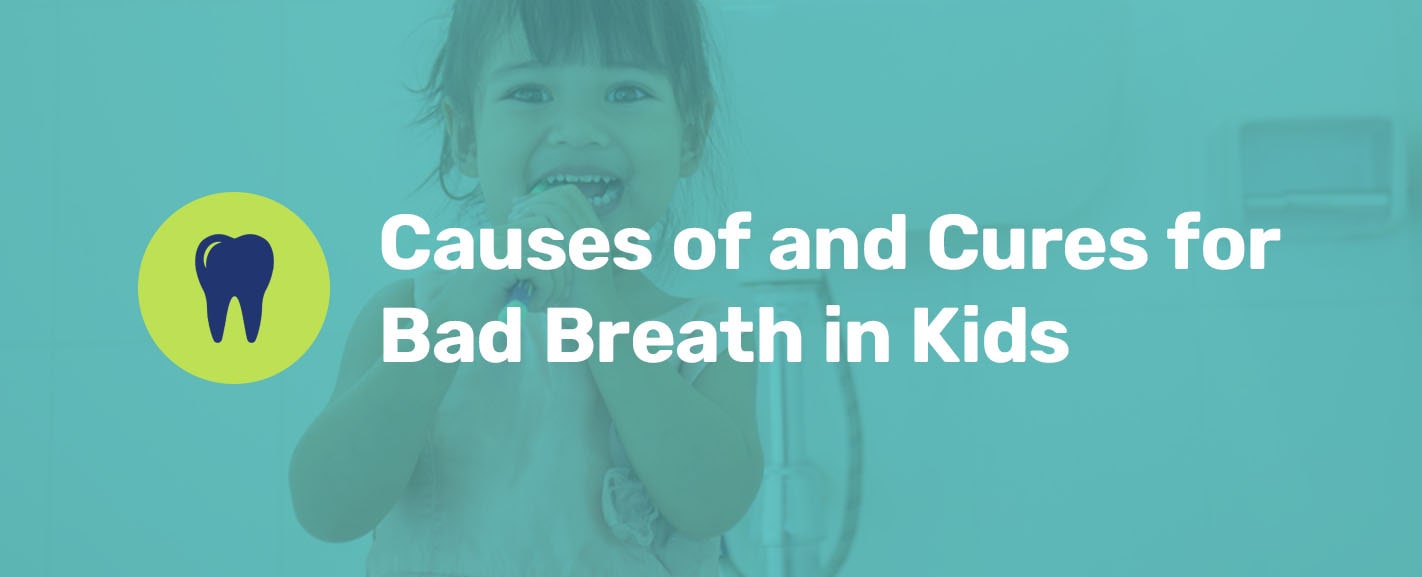Bad breath is also called halitosis. In kids, poor oral hygiene habits often cause halitosis, and other common causes of this condition include dehydration, eating certain foods or having medical conditions that make kids susceptible. Parents are often concerned by bad breath, and for teenagers, discussing the topic can be embarrassing. If you are aware of the common causes, you can help alleviate many of the stresses associated with halitosis.
In This Article:
- What Causes Bad Breath in Kids?
- Poor Oral Hygiene Can Cause Bad Breath In Toddlers
- Can Brushing and Flossing Cure Bad Breath in Children?
- What If My Child Has Bad Breath Even After Brushing?
- Dehydration and Dry Mouth Can Cause Bad Breath in Kids
- Smelly Foods Can Contribute to Halitosis in Children
- Can Mouthwash Cure Halitosis in Kids?
- Mouth Breathing and Halitosis in Kids
- Medical Concerns Related to Bad Breath and Halitosis in Kids
What Causes Bad Breath in Kids?
Halitosis or bad breath in your child can be caused by several factors, including:
- Poor oral hygiene
- Dehydration and dry mouth
- Eating smelly foods
- Medical conditions such as acid reflux or enlarged tonsils
- Medications your child is taking
- Mouth breathing
- Gum disease
- Tooth decay
- An object in nose
Poor Oral Hygiene Can Cause Bad Breath in Toddlers
Poor oral hygiene is one of the leading causes of bad breath in toddlers. The most common places in the mouth for smelly, halitosis-causing debris to hang out are between teeth and on gums and the tongue. The debris is known as plaque and gathers when food particles and bacteria sit on the teeth, causing an odor.
Can Brushing and Flossing Cure Bad Breath in Children?
Curing bad breath in toddlers that is caused by a lack of proper oral home care is relatively straightforward — improve oral hygiene! Thorough brushing for 2 minutes, correct flossing and brushing or scraping the tongue is key. Many people forget to brush their tongue or are unaware of the benefits. Odor-causing buildup can reside on the tongue, but you can get rid of this by focusing your oral care on the tongue. A special kind of brush designed specifically for your tongue is called a tongue scraper. Tongue scrapers can be found in most oral hygiene sections of drug stores.
It is important to make sure the proper techniques are being used to adequately remove all the plaque that causes bad breath. For example, slant the toothbrush bristles towards the gums at a 45-degree angle. The gumline is commonly missed when you brush, which can cause a buildup of odor from the plaque.
What If My Child Has Bad Breath Even After Brushing
Unfortunately, your child can still have bad breath even after brushing because brushing alone doesn’t clean in between the teeth. Flossing is necessary to remove the bacteria in these areas. From traditional floss and handle flossers to air flossers and Waterpiks, there are many different flossing options. The traditional floss and handle flossers are still the best options, while other flossing techniques and devices can be great adjuncts. The most important part of flossing is to make sure that the floss is following the contour of the tooth and going underneath the gums.
It is also important to note that a person should properly store their toothbrush in an upright position so it’s not touching anything, allowing the bristles to dry, which minimizes the bacteria that is on the toothbrush. Replace your toothbrush every 3 months or when it looks worn down — frayed bristles are a common sign! These are all good tricks to help keep your mouth clean and decrease the number of bacteria in the mouth, which are the main causes of halitosis.
Dehydration and Dry Mouth Can Cause Bad Breath in Kids
Drinking plenty of water is very important for our bodies, and the mouth is no different! Dehydration is one of the leading causes of bad breath. When we don’t drink enough water, the amount of saliva in our mouths decreases. This decrease in spit leads to a decrease in the natural ability of our saliva to clean our oral environment. As a result, we get an increase in the odor-causing bacteria in our mouths…Yuck! Luckily, this is relatively simple to cure — make sure that everyone gets plenty of water to drink, and the risk of halitosis decreases quickly.
Smelly Foods Can Contribute to Halitosis in Children
It’s not surprising that some of our favorite foods have a stinky odor. In fact, that can be part of the reason we love to eat them! Two such foods are garlic and onions, which are common ingredients in all kinds of dishes. After eating food prepared with garlic or onions, it is best to rinse your mouth with water or brush your teeth.
You can also chew a small, sugar-free piece of gum such as Trident after a meal. Gum obviously has a very sticky nature, and it can bind to some of the small food particles stuck on the teeth. Most gum flavors also have a pleasant smell that can cover up the stinky foods we eat. Plus, chewing gum can help create more saliva in our mouths, which can help limit halitosis.
Can Mouthwash Cure Halitosis in Kids?
If you already have top-notch oral hygiene practices down pat, drink plenty of water and have eliminated eating stinky foods, the next option may be to try mouth rinse. For pediatric patients, we recommend finding a rinse that contains fluoride. While some rinses are yummy bubble gum flavored, a mild mint mouth rinse will help combat some of the odors associated with halitosis.
Some adult rinses may be too spicy or strong for pediatric patients. Try a kid-friendly rinse, like ACT for Kids, or an alcohol-free rinse, such as Listerine Zero Total Care. Kids younger than 6 years of age should not use rinses, due to the likelihood of swallowing the rinse. All mouth rinses are meant to be spat out after use.
Mouth Breathing and Halitosis in Kids
Breathing consistently through the mouth can be drying and result in poor saliva production. This issue creates the same problems with bacteria overgrowth as dehydration. Mouth breathing could be a sign of an underlying condition.
An object trapped in the nose can lead to mouth breathing. If your child’s breathing has changed, ask or check if there is something stuck inside their nose. Another common cause of mouth breathing is nasal congestion caused by a sinus infection, seasonal allergies or a cold or flu. These issues can usually be treated with over-the-counter drugs, but if your child’s nose remains stuffy, it might be time to schedule an appointment with your family doctor.
Medical Concerns Related to Bad Breath and Halitosis in Kids
A few other causes of bad breath can relate to your child’s physical health. Children with acid reflux may also have halitosis. Regurgitating stomach acids and partially digested foods is hard on a child’s teeth and generally bad for the oral cavity. If this is a concern for your child, please consult with your child’s pediatrician to see if you need to change your child’s diet or if they need special medication.
Large tonsils or adenoids may also cause halitosis. Enlarged tonsils and adenoids, which sit at the back of the throat, can harbor lots of bacteria, which may lead to halitosis. Large tonsils can also cause snoring and sleep apnea. In severe instances, your child may need to be evaluated by an Ear, Nose and Throat specialist, or ENT.
Problems with your child’s dental health like tooth decay and gum disease can also cause bad breath. Bacteria overgrowth causes an odor, as bacteria’s acid byproducts decompose tissues in and around the child’s diseased tooth or gums. Cavities should be treated right away or as soon as your child notices them. Tooth decay is a painful condition and could lead to more serious problems if left untreated.
Lastly, certain medications can also lead to a decrease in saliva flow, which can lead to bad breath. If your child is taking medications daily due to a specific medical condition, it is important to know that their saliva flow may be less. It is often best to increase water consumption to offset the decreased flow of saliva.
Contact Sprout Pediatric Dentistry & Orthodontics
At Sprout Pediatric Dentistry & Orthodontics, we can discuss halitosis at your child’s dental check-up. If it is a concern, we can help recommend techniques and cures that may be individualized for your child’s specific needs! Schedule an appointment today.

Dr. Dana grew up in Portland and went to Temple University in Philadelphia, PA for dental school. She then moved to Anchorage, AK for her residency in Pediatric Dentistry. Dr. Dana takes a holistic approach to pediatric dentistry & is able to use her own parenting experience to sympathize and understand each family’s unique dynamic.



